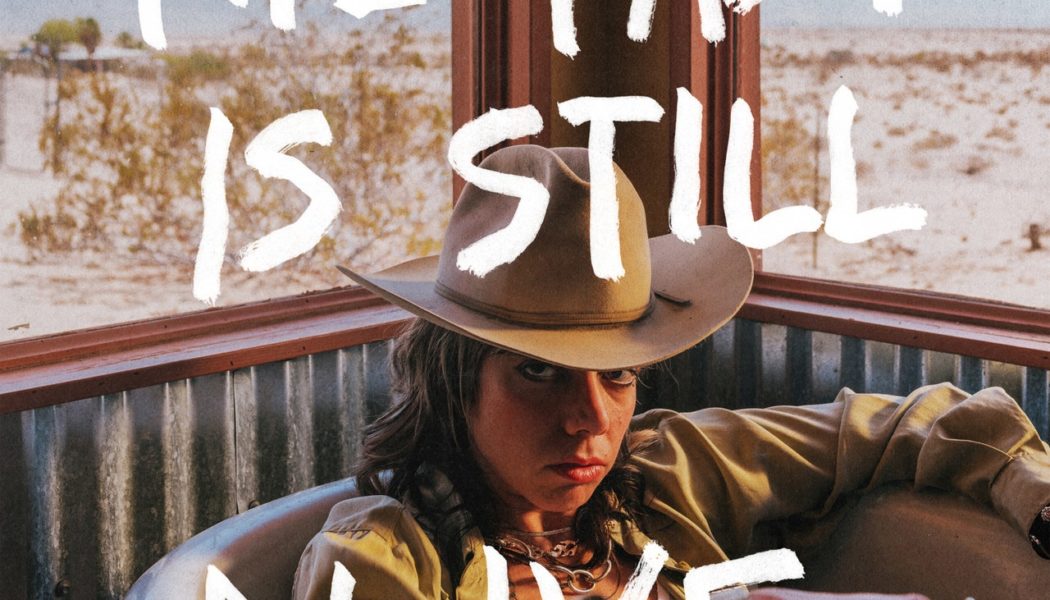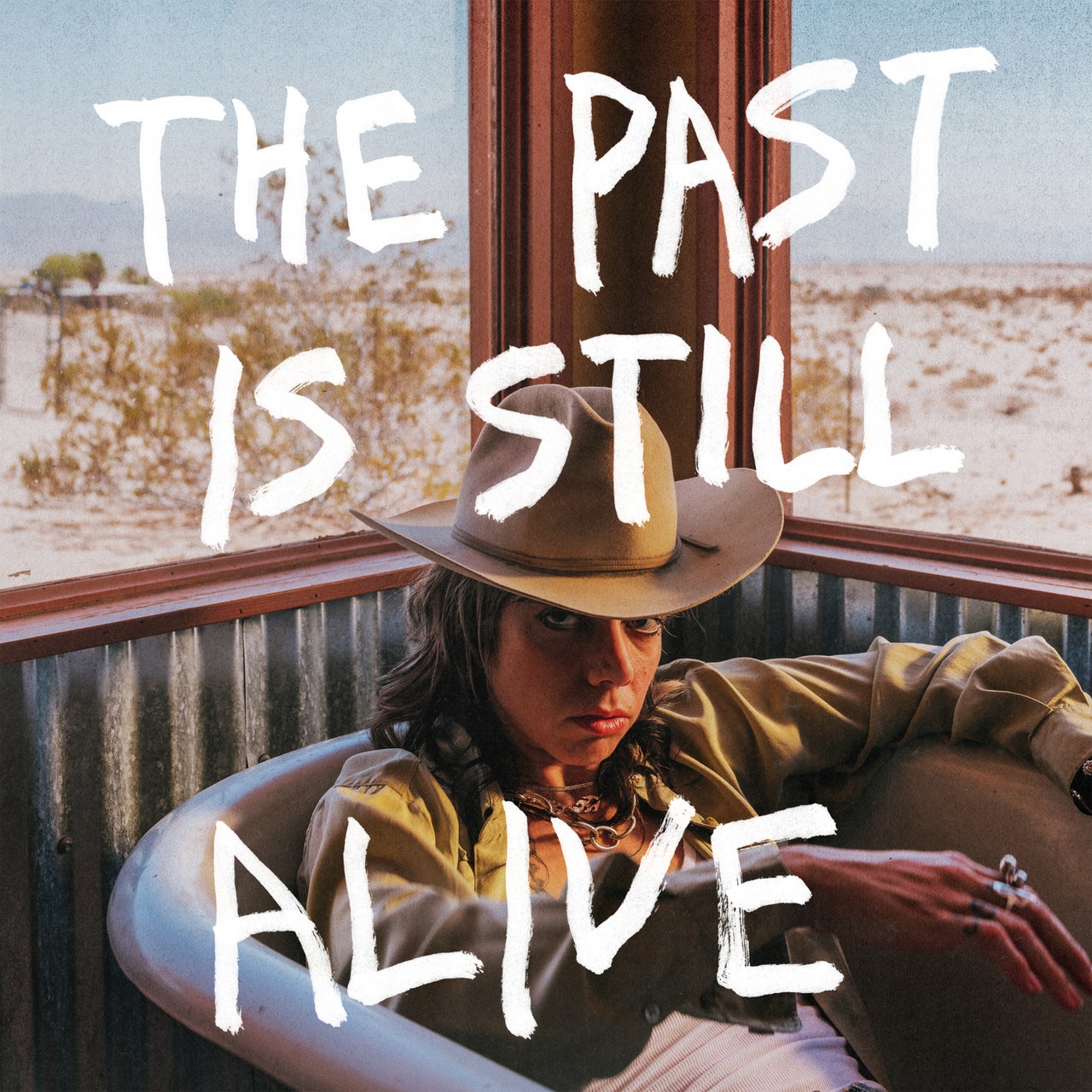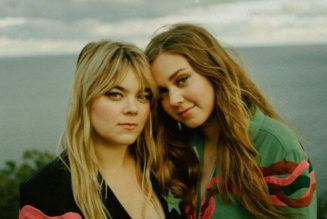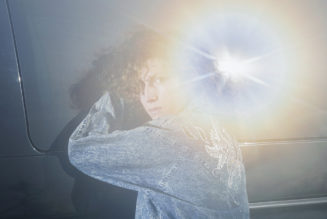In Juan Gómez Bárcena’s 2023 novel Not Even the Dead, a former conquistador accepts a mysterious quest from the colonial government of Mexico. He must leave his wife and home, but it’s going to be worth it—the job pays gold, and it should only take two weeks. Off he goes, riding horseback into numerous trials and tribulations, all the while reassuring himself: Two weeks. Two more weeks will do the trick. Two weeks is the least of his problems because he’s not only riding, he’s time traveling—advancing by decades and then centuries, tripping and stumbling into future worlds where the legends and prejudices of the past continually take on new shapes. Eventually he’s reincarnated as a migrant worker, hitching a ride on a train.
“Time can take you for a ride,” Alynda Segarra sings near the top of their ninth album, The Past Is Still Alive. Rather than horses, Segarra mostly writes about trains, because they used to hop a few themself and because of the way the train, the first rhythm of rural industrialization, runs beneath the American blues and folk music that inform their career as Hurray for the Riff Raff. That’s the shaky-steady forward momentum driving The Past Is Still Alive: part folk-punk memoir, part harm-reduction PSA, part spiritual invocation and/or world-historical séance. The location is: Out there somewhere and the time is: Don’t you know all time is connected?
The Past Is Still Alive represents a turn back toward more traditionally Americana textures after 2022’s Life on Earth, a kind of electronic rewilding project that followed the slicker, self-consciously conceptual The Navigator. The sound is dusky, naturalistic, one-third electric and two-thirds acoustic; we see softness and joy in the human experience and, lurking in the background, violence, fentanyl, and barrels of crude. Producer Brad Cook plays bass here, along with a core studio lineup including brother Phil Cook (piano, organ, Wurltizer, dobro) and drummer Yan Westerlund—what one might call the alternate-reality Megafaun, featuring two original member-brothers and the third member’s brother (behold, the ever-reaching influence of DeYarmond Edison).
Elements from Segarra’s biography appear in flashes throughout their discography but rarely as explicitly as in The Past Is Still Alive, a vivid time travelogue that reflects on Segarra’s youthful misadventures as a “dirty kid” or punk traveler with humility, nostalgia, and transhistorical perspective. In the retelling, shoplifting and dumpster diving for food represent both self-sufficiency and secret shame. And when you have no place to go, a train will take you somewhere. It’s certainly not the lifestyle for everyone: “Here’s a silver spoon, you can eat your heart out as a prize,” Segarra taunts, or cautions, on highlight “Hawkmoon,” a rollicking coming-of-age story honoring a trans mentor, Miss Jonathan, who’s assaulted and never seen again.
It seems Segarra has been thinking about the vast psychic geographies and American histories where trains (and queer punks) go that ordinary civilians usually don’t, probably singing the last three verses of “This Land Is Your Land” and not just the first half, namechecking poet Eileen Myles alongside a legendary writer of freight-train graffiti, and leading off the album with a pair of death-defying gestures: “Alibi,” summoning a friend back from the brink of addiction, and “Buffalo,” about the extinction of the Great Plains’ original movement economy. “Two weeks just to catch the buffalo,” they chant, and I picture the animals receding further toward the horizon, further still, until the day these unnamed hunters must accept that they won’t be found again. And then—the herd “one day magically appeared.” Time travel.
Segarra sounds best delivering a prophetic-sounding folk song, maybe because it’s how I first encountered their work on older cuts like “End of the Line” or “Look Out Mama.” The Past Is Still Alive’s fantastical yet sharply observed writing and revival of a more traditional sound feels like a homecoming. The album was recorded in the weeks immediately following the death of Segarra’s father, Jose Enrico Segarra, or “Quico,” who leaves behind its closing voicemails. “It’s all in the past but the past is still alive,” Segarra snarls on “Vetiver,” the title phrase showing up in a place that isn’t the title track because it’s just that kind of album: unbounded. They’re in wild form on that song, a deliciously slurry traveler’s ballad about transience and relationships also featuring a Bob Dylan banger of a pregnant phrase, “You know nothing is free/But it could certainly be.” And they continue to grow into their own poetic voice, one that climbs a little stair-stepping melody and turns on its heel with a well-timed profanity or an emphatic reminder to test your drugs. “I’d never heard a song mention Narcan,” Segarra said at a recent listening event, so they wrote one that promotes the emergency overdose reversal by name.
At last they speak to the future on “Ogallala,” the name of a Nebraska town (itself named for a tribe of the Lakota People) where the album’s apocalyptic subtext finally erupts to the surface. So effective is The Past Is Still Alive at defying time—reversing, revisiting, slipping through—that in the end I wish it were true. Brad Cook’s rich, earthy touches are all over the upcoming Waxahatchee album and Jess Williamson’s most recent, among numerous prominent credits in recent years. And Segarra’s most morose monologue does sound quite like Conor Oberst when he’s singing backup on the very Bright Eyes-y “The World Is Dangerous.” Aesthetically, in these moments, The Past Is Still Alive feels notably of the present as a contemporary indie-rock record, rather than the way I’d ideally prefer to obtain it, which is handed over by a mysterious stranger at the back of a nameless little ghost town saloon. I don’t expect that’ll happen soon, but imagine a Hurray for the Riff Raff album that’s woolier and weirder, like their take on ’70s Van Morrison, or out-of-time completely like (if you’ll forgive me for one more train joke) their very own Blood on the Tracks? I don’t believe Segarra has totally cracked that on record yet, and it’s a gift to hear them on their way. All the while I was alone, the past was close behind. If this is the end of history, then right now is the most past there’ll ever be. Hold on baby, we’re living in it.
All products featured on Pitchfork are independently selected by our editors. However, when you buy something through our retail links, we may earn an affiliate commission.










